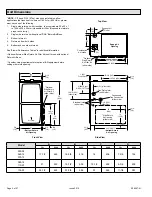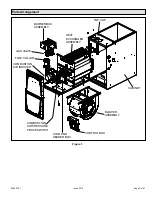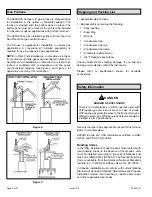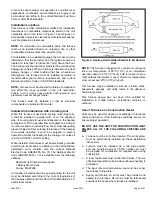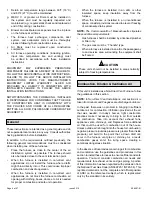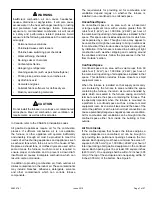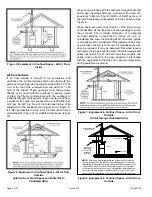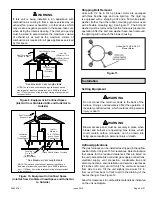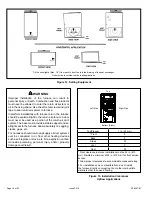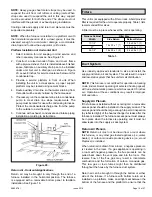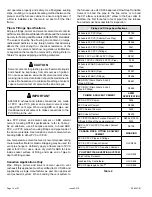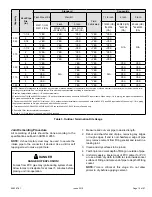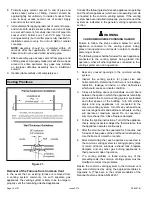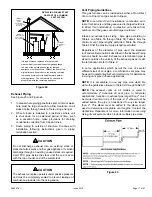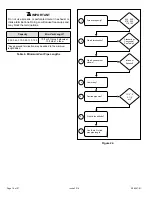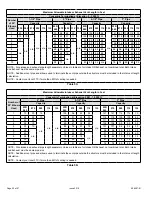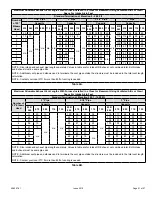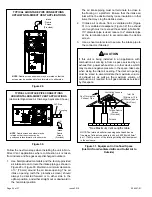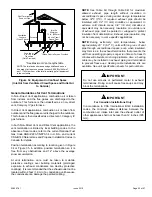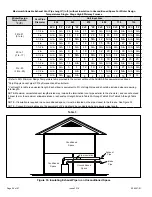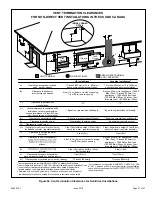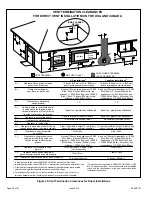
508297-01
Page 13 of 57
Issue 2219
NOTE:
Heavy-gauge sheet metal straps may be used to
suspend the unit from roof rafters or ceiling joists. When
straps are used to suspend the unit in this way, support
must be provided for both the ends. The straps must not
interfere with the plenum or exhaust piping installation.
Cooling coils and supply and return air plenums must be
supported separately.
NOTE:
When the furnace is installed on a platform or with
the horizontal suspension kit in a crawl space, it must be
elevated enough to avoid water damage, accommodate
drain trap and to allow the evaporator coil to drain.
Platform Installation of Horizontal Unit
1. Select location for unit keeping in mind service and
other necessary clearances. See Figure 18.
2. Construct a raised wooden frame and cover frame
with a plywood sheet. If unit is installed above finished
space, fabricate an auxiliary drain pan to be installed
under unit. Set unit in drain pan as shown in Figure
20. Leave 8 inches for service clearance below unit for
condensate trap.
3. Provide a service platform in front of unit. When
installing the unit in a crawl space, a proper support
platform may be created using cement blocks.
4. Route auxiliary drain line so that water draining from
this outlet will be easily noticed by the homeowner.
5. If necessary, run the condensate line into a condensate
pump to meet drain line slope requirements. The
pump must be rated for use with condensing furnaces.
Protect the condensate discharge line from the pump
to the outside to avoid freezing.
6. Continue with exhaust, condensate and intake piping
installation according to instructions.
Figure 20.
Return Air - Horizontal Applications
Return air may be brought in only through the end of a
furnace installed in the horizontal position. The furnace
is equipped with a removable bottom panel to facilitate
Filters
This unit is not equipped with a filter or rack. A field provided
filter is required for the unit to operate properly. Table 1 lists
recommended filter sizes.
A filter must be in place whenever the unit is operating.
Furnace Cabinet
Width
Filter Size
Side Return
Bottom Return
17-1/2”
16 x 25 x 1 (1)
16 x 25 x 1 (1)
21”
20 x 25 x 1 (1)
24-1/2”
16 x 25 x 1 (2)
24 x 25 x 1 (1)
Table 1.
Duct System
Use industry approved standards to size and install the
supply and return air duct system. This will result in a quiet
and low-static system that has uniform air distribution.
NOTE:
This furnace is not certified for operation in heating
mode (indoor blower operating at selected heating speed)
with an external static pressure which exceeds 0.5 inches
w.c. Operation at these conditions may result in improper
limit operation.
Supply Air Plenum
If the furnace is installed without a cooling coil, a removable
access panel should be installed in the supply air duct. The
access panel should be large enough to permit inspection
(by reflected light) of the heat exchanger for leaks after the
furnace is installed. The furnace access panel must always
be in place when the furnace is operating and it must not
allow leaks into the supply air duct system.
Return Air Plenum
NOTE:
Return air must not be drawn from a room where
this furnace, or any other gas fueled appliance (i.e., water
heater), or carbon monoxide producing device (i.e., wood
fireplace) is installed.
When return air is drawn from a room, a negative pressure
is created in the room. If a gas appliance is operating in
a room with negative pressure, the flue products can be
pulled back down the vent pipe and into the room. This
reverse flow of the flue gas may result in incomplete
combustion and the formation of carbon monoxide gas.
This raw gas or toxic fumes might then be distributed
throughout the house by the furnace duct system.
Return air can be brought in through the bottom or either
side of the furnace. If a furnace with bottom return air is
installed on a platform, make an airtight seal between the
bottom of the furnace and the platform to ensure that the


